|
|
|
Sort Order |
|
|
|
Items / Page
|
|
|
|
|
|
|
| Srl | Item |
| 1 |
ID:
095499
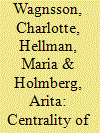

|
|
|
|
|
| Publication |
2010.
|
| Summary/Abstract |
The globalized security situation characterized by transnational threats and international interventionism in "new wars," connect non traditional local actors and traditional global actors to one another in unprecedented ways. We argue that children in particular need to be highlighted because they are highly pertinent to the globalized security situation, yet they make up one of the few agents that have remained non-politicized in the eyes of the scholarly community. The article suggests a framework of analysis that can generate analyses on security of traditional as well as non-traditional agents. Placing non-traditional groups in the center of attention serves to mirror the complexities of the current security situation better.
|
|
|
|
|
|
|
|
|
|
|
|
|
|
|
|
| 2 |
ID:
144726
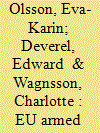

|
|
|
|
|
| Summary/Abstract |
This article explores how armed forces in EU member states work with and view social media in national and international settings, and what the patterns of convergence/divergence are on these issues. To that end, a questionnaire targeted at EU armed forces was constructed. An index of qualitative variation was calculated to explore the relative convergence among respondents (n = 25) on issues of risks and opportunities with using social media nationally and internationally. Consistent with previous research on European armed forces, we found higher levels of divergence than convergence. Contrary to our expectations that similar challenges, joint international standards, and membership in international organizations would foster convergence with regard to social media use in areas of deployment, we found that convergence appeared foremost pertaining to the domestic level. Policy divergence was strongest in areas of deployment.
|
|
|
|
|
|
|
|
|
|
|
|
|
|
|
|
| 3 |
ID:
153337
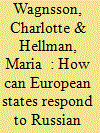

|
|
|
|
|
| Summary/Abstract |
How can European democratic states respond to Russian information warfare? This article aims to enable and spur systematic research of how democracies can respond to the spread of distorted information as part of information warfare. The article proposes four ideal-type models representing different strategies that democratic governments can employ; blocking, confronting, naturalising and ignoring. Each strategy is illustrated by ways of empirical examples of strategies applied by European states in view of what is regarded as an unwelcome Russian strategic narrative that is spread as part of information warfare. We problematise each strategy and explore reasons for why states choose one strategy over another. We then explore how different strategies might contribute to destabilise or stabilise the security environment and how they resonate with democratic values. Finally, we contribute to theorising on strategic narratives by highlighting that the choice of strategy will influence states in their formation of strategic narratives. We thus further theorising on strategic narratives by highlighting the link between strategies and narratives, thus identifying one central dynamic in how narratives are formed.
|
|
|
|
|
|
|
|
|
|
|
|
|
|
|
|
| 4 |
ID:
110769
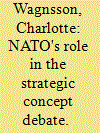

|
|
|
|
|
| Publication |
2011.
|
| Summary/Abstract |
This article argues that traditional Westphalian powers are increasingly pressured to move beyond Westphalia towards institutionalization of security cooperation and a broader definition of referent objects of security. Focusing on the case of the North Atlantic Treaty Organization (NATO), it notes that the Alliance is severely torn between traditional constructions of 'the self' and a need for change. Exploring how NATO handles this dilemma, the article examines how the Alliance articulated its constitutive story during the strategic concept process of 2009-10. Four roles are crystallized from the reading of the narrative: the fire-fighter, the watchdog, the good neighbour and the seminar leader. It is argued that NATO will be able to meet the exigencies of the post-Westphalian world more or less effectively depending on how it develops in each of these roles. The article concludes that NATO largely remains Westphalian in its four roles, but the launching of the seminar leader role indicates that it may be preparing a farewell to Westphalia. NATO is a composite actor and tensions between academic, global reformist and traditionalist regional story-lines will prevail. Nevertheless, the globalized threat environment is likely eventually to force NATO to fully recognize the need for a more post-Westphalian approach to security.
|
|
|
|
|
|
|
|
|
|
|
|
|
|
|
|
| 5 |
ID:
108773
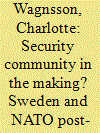

|
|
|
|
|
| Publication |
2011.
|
| Summary/Abstract |
The article asks what the evolution of NATO-Swedish relations signifies for the understanding of the evolution of security communities. Given the astonishing evolution of NATO and Sweden as a community of practise, it is logical to imagine the two as forming part of the same security community. It could then be argued that common practise can bring about new security communities rather hastily. Analysing NATO's and Sweden's recent discourses on security, the author identifies a significant gap between a principally realist and a predominantly idealist discourse that indicates that the two parties do not share key characteristics of a security community - identities, values and meanings. However, if Libya is the case of the future, the discursive differences may fade and Sweden could more easily pursue its journey towards inclusion in NATO, not as a member of an Alliance, but as a member of NATO as a security community.
|
|
|
|
|
|
|
|
|
|
|
|
|
|
|
|
| 6 |
ID:
175454
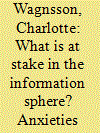

|
|
|
|
|
| Summary/Abstract |
Scholars, states and organisations have warned that authoritarian regimes and other hostile actors are projecting information to inflict harm upon others. Yet, there is little agreement on the nature of this threat. This is mirrored in the plethora of labels in use, ranging from “disinformation” to “sharp power” and “information warfare”. In order to investigate this menace further, we turn our focus to ordinary people’s anxieties, since a better understanding of threat perceptions will also provide a better understanding of the problem. We conducted a comprehensive case study comprising focus group discussions (n: 97) and an extensive survey (n: 2046) among Swedish citizens. We asked: To what extent do people worry about information influence and why? What can this tell us about the nature of this problem or threat? The empirical results suggest that respondents were first and foremost worried about societal cohesion and democracy. They also identified a risk that information influence can undermine trust in societal institutions and the EU. Based on our findings, we suggest that “malign information influence” is an appropriate label to be used in future research. Finally, we propose directions for future systematic research on how malign information infuence is received and processed in different national contexts.
|
|
|
|
|
|
|
|
|
|
|
|
|
|
|
|
|
|
|
|
|